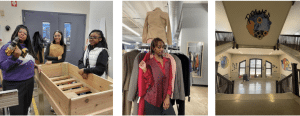Transforming Learning: The Power of Competency-Based Models
CompetencyWorks Blog
Inside a busy classroom in Philadelphia, students are focused on collaborating to create a campaign for a flu clinic that is being implemented by the school-based health center. As the teacher circulates among the group, she hears students discussing the fears about vaccines that they have heard from their peers, friends and family.
The teacher pushes students to research some of these claims and to consider how to communicate what they find to diverse audiences. Debates ensue within the groups about the message and the messenger. One group begins to research the historical context that has created distrust related to vaccines.
With fifteen minutes to go, the teacher pauses the class and asks each group to reference the collaboration assessment tool/rubric. Students begin a process of evaluating the effectiveness of their collaborative session based on the indicators and performance levels. They provide each other feedback and then set goals for their session the next day.
Preparing Students for the World with Competency-Based Education
This is what it feels like to be a student in a competency-based school. In contrast to traditional approaches, competency-based education does more to prepare students for the world of work and citizenship they will encounter once they leave school. It does so by operating with three guiding principles:
Expand Beyond Traditional Academic Skills
As research from America Succeeds makes clear, academic skills are no longer sufficient. The workforce now requires that employees possess durable skills like creativity, critical thinking, collaboration, communication, and leadership to continually adapt to shifting workplace demands. When students graduate, they are confronting an uncertain and increasingly complex world making these skills critical for preparing young people to navigate the world around them.
In competency-based models, students apply their academic skills to address a relevant community-based challenge (like the creation of a flu clinic). To respond successfully to the challenge, they need to consider how to work collaboratively with their peers and communicate their ideas with diverse audiences.
Tailor to Meet Students’ Different Learning Abilities and Interests
Students are also empowered to guide their own learning experience. They draw from their insights (on topics like vaccine hesitancy) to explore new topics and decide how they will share that learning with others.
Cutting-edge brain science research on what young people need most during their adolescent years from UCLA’s Center for the Developing Adolescent emphasizes the importance of learning by exploring the world and testing out new ideas and experiments, both of which are central to competency approaches. These approaches also tap into what research shows are two of the most critical components of student motivation: relevance and interest.
Align Assessment to Mastery of Competencies
Traditional educational models typically rely on artificial proxies for learning, such as courses taken and number of years in school. In contrast, competency-based models measure learning based on mastery of essential knowledge and skills. These expectations for learning are made explicit and transparent to students, who play a critical role in guiding the feedback process (like the students who used rubrics to reflect on their progress in creating a campaign for a flu clinic).
Research on the science of learning shows that this type of feedback is critical to student growth. In competency-based models, educators meet students at their level and design learning progressions that successfully build on their prior knowledge.
How is Philadelphia Approaching Competency-Based Education?

Recent national research has shown a real enthusiasm for competency-based education. And yet, as innovators work to implement competency-based approaches across the country, they face considerable obstacles when integrating their models into the traditional educational system. It can also be challenging to define and assess competencies in a way that is both meaningful and scalable.
In a recent report, Transforming Learning: The Power of Competency-Based Models, we document how three high schools in Philadelphia – Building 21, the Workshop School, and the U School – set out to collectively tackle these challenges. Over the last year, the leaders from these schools collaborated to identify a set of core competencies that could be used as the foundation for measuring students’ preparedness for success beyond high school. Their goal was to learn from each other’s approaches and develop the foundation for a more holistic understanding of student success that could be used to inform a different way of assessing student progress.
The core competencies they identified fall into three categories of skills – analytical, personal development, and interpersonal. These competencies guide students toward mastering essential skills in areas like critical thinking, time management, and relationship building.

The leaders then crosswalked each school’s unique approach to measuring these competencies and compared how data was collected to capture information on whether students met expectations. They are currently exploring ways to develop a more unified and consistent system of assessment of competencies across schools.
What Can We Learn from Philadelphia’s Experience?
The Philadelphia experience reveals important lessons for other school leaders interested in collaborating on – and scaling – this type of competency-based approach.
- Start by identifying the essential core that needs to be replicated. Each of the three schools has a comprehensive set of competencies and associated learning continuum, which means it can be easy to get lost in the details of the respective models. This collaborative effort required identifying what was most meaningful and universal across the approaches to share with a wider audience.
- Lean into humility. Identifying what was most essential required each leader to let go of certain elements of their approach to come into greater alignment with the other schools. This meant admitting what wasn’t working and opening up to learn from others.
- Engage in creative and iterative problem-solving. The shared list of competencies took many different forms over the course of the project… and are still evolving. Leaders interested in this type of collaboration need to embrace the fact that the outcome will likely iterate over time (just like student work does in a competency-based model!).
At the system level, scaling competency-based education requires investing in structures, resources, and practices that promote a different way of approaching teaching and learning. For example, this could look like developing alternative graduation requirements or giving schools autonomy to tailor their learning management systems and professional development to better meet the needs of their students and educators. It also involves rethinking traditional grading systems, time-based learning, and age-based groupings. Interrogating these structures and practices requires shifts in both mindsets and systems.
The School District of Philadelphia is embarking on a strategic effort to develop a shared vision and aligned set of principles, outcomes, and strategies for supporting innovative school models and practices across the city.
The Philadelphia experience offers an example of what is possible when school leaders come together to collaboratively develop a common set of competencies. While it’s challenging to implement and scale these models, the benefits are clear. Competency-based education offers a more personalized, practical approach to learning – one that equips young people with skills for lifelong success.
Learn More
- Pennsylvania’s Journey Towards Student-Centered Learning: Building a Collaborative Statewide Movement
- Learner-Centered Ecosystems as a Path Forward for Public Education: A Convergence of Perspectives and Research
- Competency-Based Education 101: Demystifying CBE, Unlocking Deep and Joyful Learning
 Claire Robertson-Kraft, PhD, is an experienced educator and evaluator who is committed to bridging research and practice to enhance educational outcomes. She is the Founder and Executive Director of ImpactED at the University of Pennsylvania and an instructor at the University of Pennsylvania.
Claire Robertson-Kraft, PhD, is an experienced educator and evaluator who is committed to bridging research and practice to enhance educational outcomes. She is the Founder and Executive Director of ImpactED at the University of Pennsylvania and an instructor at the University of Pennsylvania.